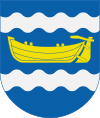Uusimaa
| Uusimaa – Nyland Uudenmaan maakunta Nylands landskap | |||
|---|---|---|---|
| Region | |||
| |||
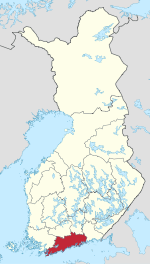 Uusimaa on a map of Finland | |||
| Country | Finland | ||
| Historical province | Uusimaa | ||
| Government | |||
| • Regional Mayor | Ossi Savolainen | ||
| • President of the Council | Eero Heinäluoma (SDP) | ||
| Area | |||
| • Total | 9,568.26 km2 (3,694.33 sq mi) | ||
| Population (30.4.2015) | |||
| • Total | 1,610,550 | ||
| • Density | 170/km2 (440/sq mi) | ||
| Time zone | EET (UTC+2) | ||
| • Summer (DST) | EEST (UTC+3) | ||
| ISO 3166 code | FI-18 | ||
| NUTS | 181 | ||
| - Nominal GDP(2014) | €78/ $105 billion | ||
| - Nominal GDP Per capita(2014) | €50,000/ $66,000 [1] | ||
| Regional bird | Blackbird | ||
| Regional fish | Zander | ||
| Regional flower | Windflower | ||
| Regional animal | European hedgehog | ||
| Regional stone | Hornblende | ||
| Website | uudenmaanliitto.fi | ||
Uusimaa or Nyland (Finnish: [ˈuːsimɑː]; Swedish: [ˈnyːland]; both names mean “new land”) is a region in Finland. It borders the regions Southwest Finland, Tavastia Proper, Päijänne Tavastia and Kymenlaakso. Finland’s capital Helsinki (its largest city) and its second largest city Espoo are both located centrally in Uusimaa, making it by far the most populous region.
History
Uusimaa was, along with the rest of Southern and Western Finland, held by the Kingdom of Sweden from the 12th or 13th century.
The coastal Uusimaa had earlier been sparsely populated, mostly by Tavastians, but was from the 12th century populated by Swedish settlers, mostly from Hälsingland, and Swedish-speaking villages came up near the mouths of Vantaanjoki and Keravanjoki.
The names Uusimaa and Nyland mean “new land” in English. The Swedish-language name Nyland appears in the documents from the 14th century. The Finnish-language name Uusimaa appears for the first time in 1548 as Wsimaa in the first translation of the New Testament to Finnish by Mikael Agricola.[2]
The Finnish provinces were ceded to Imperial Russia in the War of Finland in 1809. After this, Uusimaa became the Province of Uusimaa of the old lääni system. From 1997 to 2010, Uusimaa was a part of the Province of Southern Finland. It has been divided in the regions of Uusimaa and Eastern Uusimaa. In 2011, two regions were merged.
Languages
Uusimaa is an officially bilingual region, with both Finnish and Swedish having the same status.
The region, especially coastal areas, is traditionally Swedish-speaking, the traditional regional dialects of Swedish (nyländska) are currently mostly spoken in Eastern Uusimaa, while in the rest of Uusimaa Swedish language became more standardised.
The Finnish-speaking population started to grow when the capital of the Grand Duchy of Finland was moved from Turku to Helsinki by Emperor of Russia Alexander I in 1812, and the region attracted settlers from other parts of Finland. Helsinki's slang, stadin slangi, first evolved in the late 19th century.
8.5% of population of the region speak Swedish language as native.
Municipalities

The region of Uusimaa is made up of 26 municipalities, of which 13 have city status (marked in bold).
|
Helsinki Sub-region: |
Raseborg Sub-region: Loviisa Sub-region:
Porvoo Sub-region: |
Gallery
-
Helsinki Cathedral, the symbol of the capital
-
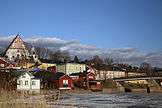
Porvoo Old Town
-

Nurmijärvi Church
-
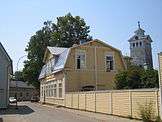
Tammisaari Old Town
-

A view of central Helsinki with the Railway Station
-

A view of Hanko, the southernmost town in Finland
-
The cottage where Aleksis Kivi died, Tuusula; an example of late 19th century housing in the area
-
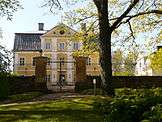
Fagervik Manor, Inkoo; there are plenty of manor houses in the area
-
The medieval, late 15th century Lohja Church is one of the biggest of its kind in Finland
-
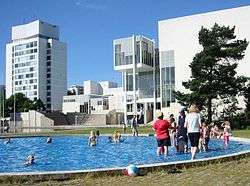
Tapiola, Espoo
-
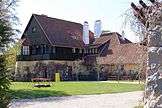
Hvitträsk, a residence in National Romantic Style in Kirkkonummi, now a museum
-

A view from Fiskars, Pohja; the corporation was founded as an ironworks in the village
-
A rural 19th century peasant interior in Lohilampi Museum, Sammatti
-
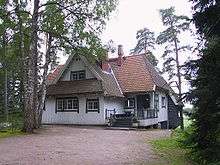
Ainola, Home of Jean Sibelius, in Järvenpää
-
Loviisa Town Hall
-
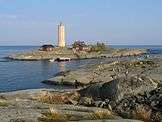
A view of Finnish Gulf in Porvoo Archipelago with Söderskär Lighthouse
-
_in_Tammisaari_Finland.jpg)
Raseborg Castle from the 14th century, partly ruined
-
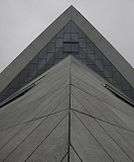
Hyvinkää Church, one of the best examples of modern Finnish church architecture
-
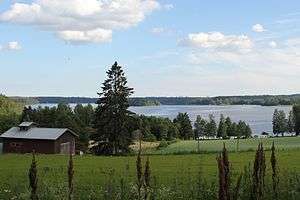
A rural landscape in Pusula with Lake Hiidenvesi
-

Kerava town centre tower blocks
-
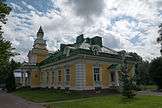
Hirvihaara Manor, Mäntsälä
-
Karkkila, a small town in north of the region
-

Suomenlinna Fortress with the city of Helsinki in the background
-

A view from Nuuksio National Park, Espoo
-
Leppävaara, one of Espoo's centres
Media
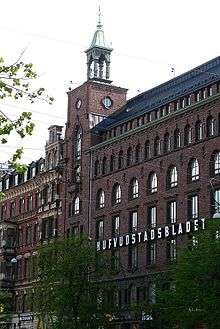
Newspapers
The largest subscription newspapers published in the region are Helsingin Sanomat and Hufvudstadsbladet in Helsinki, Aamuposti in Hyvinkää, Länsi-Uusimaa in Lohja, Loviisan Sanomat and Östra Nyland in Loviisa, Uusimaa and Borgåbladet in Porvoo, Västra Nyland in Raasepori, and Keski-Uusimaa in Tuusula. Also two popular tabloid newspapers, Iltalehti and Ilta-Sanomat, are published there.
Radio stations
Yle's local radio stations in the western part of the region are Finnish-language Ylen läntinen and Swedish-language Yle Radio Vega Västnyland, in the Capital Region Finnish-language Ylen aikainen and Swedish-language Yle Radio Vega Huvudstadsregionen, and in the eastern part Finnish-language Yle Radio Itä-Uusimaa and Swedish-language Yle Radio Vega Östnyland.
Heraldry
The coat of arms of the region shows a yellow boat which is a symbol for the coastal areas, and two silver streams which are the symbol for rivers.
Uusimaa received its coat of arms at the end of the 16th century. There is an image of the coat of arms made in 1599. In 1997, the traditional coat of arms became the official coat of arms of the region.
References
- ↑ "2014 GDP per capita in 276 EU regions" (PDF) (in German). Eurostat. 2014. Retrieved 3 November 2016.
- ↑ Uusimaa Regional Council (May 12, 2010). "Nytt Land, Nylands historia" (in Swedish). Retrieved May 17, 2010.
External links
| Wikimedia Commons has media related to Uusimaa. |
| Wikivoyage has a travel guide for Uusimaa. |
Coordinates: 60°15′N 24°30′E / 60.250°N 24.500°E
